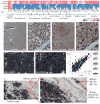Integrated genome and transcriptome sequencing identifies a novel form of hybrid and aggressive prostate cancer
- PMID: 22294438
- PMCID: PMC3768138
- DOI: 10.1002/path.3987
Integrated genome and transcriptome sequencing identifies a novel form of hybrid and aggressive prostate cancer
Abstract
Next-generation sequencing is making sequence-based molecular pathology and personalized oncology viable. We selected an individual initially diagnosed with conventional but aggressive prostate adenocarcinoma and sequenced the genome and transcriptome from primary and metastatic tissues collected prior to hormone therapy. The histology-pathology and copy number profiles were remarkably homogeneous, yet it was possible to propose the quadrant of the prostate tumour that likely seeded the metastatic diaspora. Despite a homogeneous cell type, our transcriptome analysis revealed signatures of both luminal and neuroendocrine cell types. Remarkably, the repertoire of expressed but apparently private gene fusions, including C15orf21:MYC, recapitulated this biology. We hypothesize that the amplification and over-expression of the stem cell gene MSI2 may have contributed to the stable hybrid cellular identity. This hybrid luminal-neuroendocrine tumour appears to represent a novel and highly aggressive case of prostate cancer with unique biological features and, conceivably, a propensity for rapid progression to castrate-resistance. Overall, this work highlights the importance of integrated analyses of genome, exome and transcriptome sequences for basic tumour biology, sequence-based molecular pathology and personalized oncology.
Copyright © 2012 Pathological Society of Great Britain and Ireland. Published by John Wiley & Sons, Ltd.
Conflict of interest statement
No conflicts of interest were declared.
Figures



References
-
- Stratton MR. Exploring the genomes of cancer cells: progress and promise. Science. 2011;331:1553–1558. - PubMed
-
- Hudson DL. Epithelial stem cells in human prostate growth and disease. Prostate Cancer Prostat Dis. 2004;7:188–194. - PubMed
-
- Long RM, Morrissey C, Fitzpatrick JM, et al. Prostate epithelial cell differentiation and its relevance to the understanding of prostate cancer therapies. Clin Sci (Lond) 2005;108:1–11. - PubMed
Publication types
MeSH terms
Substances
Grants and funding
LinkOut - more resources
Full Text Sources
Medical
Molecular Biology Databases

